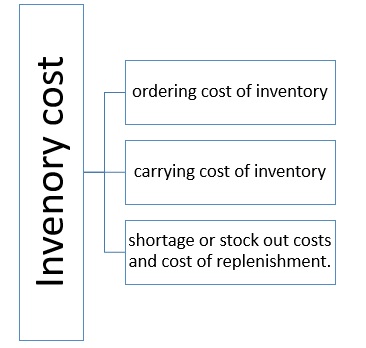- Business Concepts ›
- Operations and Supply Chain ›
- Inventory Costs
Inventory Costs
Definition, Importance & Types
This article covers meaning & overview of Inventory Costs from operations perspective.
What is meant by Inventory Costs?
Inventory costs are the costs associated with the procurement, storage and management of inventory. It includes costs like ordering costs, carrying costs and shortage / stock out costs. Inventory is one of the most important assets for a company or a manufacturer. They need to handle it well and it requires cost for maintaining, storing, replacing and moving inventory.
All these costs are collectively known as inventory costs.
Types of Inventory Costs
Inventory costs can be categorized into three main sub headings:
Ordering cost
Ordering cost of inventory refers to the cost incurred for procuring inventory. It includes cost of purchase and the cost of inbound logistics.
In order to minimise the ordering cost of inventory we make use of the concept of EOQ or Economic Order Quantity.
Carrying Cost
Carrying cost of inventory refers to the cost incurred towards inventory storage and maintenance.
The inventory storage costs typically include the cost of building rental and other infrastructure maintained to preserve inventory.
The inventory carrying cost is dependent upon and varies with the decision of the management to manage inventory in house or through outsourced vendors and third party service providers.
Shortage Costs
Shortage or stock out costs and cost of replenishment are the costs incurred in unusual circumstances.
They usually form a very small part of the total inventory cost.

Apart from these 3 there are other types as well:
Holding Cost
Sometimes inventory can be held at a location which is different from the expected location e.g. intermediate city or warehouse.
It can also be held because of formalities and clearances. The costs which is involved in holding this inventory are called Holding Costs.
Perishability Costs
In industries where there is limited shelf life, products may get spoilt or out of its best usage dates. Such inventory cannot be sold hence has to be disposed. These costs can also include the mechanism which is required to keep these products fresh. Especially in case of vegetables and some food products, air conditioning might be required to keep them insulated from outside weather effects.
Miscellaneous Costs
Apart from these costs there would be other costs like administrative costs, labor costs, software costs etc. These days software is used to manage inventory and manage costs. There would be some cost incurred to run and maintain it also.
Read More
Importance of knowing Inventory Costs
Calculations and tracking of these inventory costs are very important because it helps manage the inventory better. If we see that one of the costs defined above is going high, we can manage that aspect of inventory in a better way. Let us say that a company deals with tomatoes and ends up paying a lot of costs in carrying and perishable costs.
This can help the company plan better so that the right amount of tomatoes can be procured and transferred before the next lot moves in.
Inventory costs example
Let us take an example of a company which sells biscuits. They procure these biscuits from a manufacturer and then sell it to retailers. Now a pack of 10 biscuits is assumed to be the SKU (Stock Keeping Unit). Now these packages would need proper storage so that the biscuits do not break or crumble before reaching the end customer.
There would be carrying costs involved in that. Then there would be a best before date for these biscuits. The company needs to move the biscuits well before that date is reached. Also the ordering cost in the beginning to buy or procure these biscuits is also involved.
Hence, this concludes the definition of Inventory Costs along with its overview.
This article has been researched & authored by the Business Concepts Team which comprises of MBA students, management professionals, and industry experts. It has been reviewed & published by the MBA Skool Team. The content on MBA Skool has been created for educational & academic purpose only.
Browse the definition and meaning of more similar terms. The Management Dictionary covers over 1800 business concepts from 5 categories.
Continue Reading:
What is MBA Skool?About Us
MBA Skool is a Knowledge Resource for Management Students, Aspirants & Professionals.
Business Courses
Quizzes & Skills
Quizzes test your expertise in business and Skill tests evaluate your management traits
Related Content
All Business Sections
Write for Us